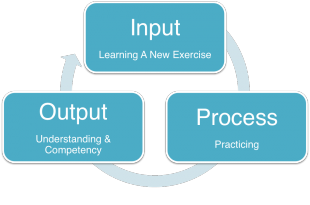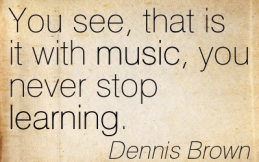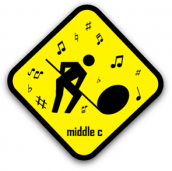How to Stay Motivated Learning Music: Exploring Mindsets
Author: Jonas Schoen-Philbert

Exploring Mindsets at Play
I recently read “The Secret of Raising Smart Kids,” a Scientific American article by Carol S. Dweck. The article begins with Carol revealing a theory about how to stay motivated, particularly with young students. She claims that if we praise students’ talents, they might not be motivated to learn because we aren’t encouraging personal effort.
Carol distinguishes between people having a “fixed mind-set” or a “growth mind-set”. Students with a “fixed mind-set” who see themselves as gifted are more likely than others to put little effort into learning something new. This is due to the risk associated with looking inept in front of their peers. Making mistakes and struggling to learn the new material will likely wreak havoc on their self esteem.
People with a “growth mind-set” don’t see intelligence as an attribute that they can have a fixed amount of, but rather have a stronger belief in their ability to solve problems, overcome obstacles and grow by learning. The growth mind-set is plays a critical role when considering how to stay motivated while learning music.
Table of Contents
Musical Talent – What is That?
When applying these theories to my learning and teaching experiences, I must first relate them to various musical abilities:
♪ Instrumental expertise, which is often a motor skill
♪ Musical ability in terms of hearing and recognizing melodies, intervals and chords, which is what we teach in ear training and is often connected to a talent of memorization
♪ Creative talent, which is self-expression connected with a strong power of imagination and the ability to focus on abstract musical and artistic concepts
These three characteristics coincide to some extent and if all are highly developed, it can be deferred that this person is likely a highly talented musician. Improving these talents requires hard and persistent work.
What does Success Look Like for a Musician?
 Let’s first reflect on how society deals with the issue of learning and success. Success is generally measured
Let’s first reflect on how society deals with the issue of learning and success. Success is generally measured
by income across all professions. “The better you are, the more you get” is the simple rule.
For artists, this historically hasn’t always been the case. Bach wasn’t too popular at his time and we might not know of him today if Felix Mendelsson-Bartholdy hadn’t brought his music to a broad public attention long after Bach’s death. Mozart died poor and his fame is a result of his father’s and widow’s promotion efforts. As an artist it can be difficult to overcome this barrier of how society judges success.
Unfortunately, marketing has become more important for artists than their musical talents. An average artist can be economically successful with good promotion, whereas an outstanding artist cannot survive without it. It always makes me happy to see good musicians being successful and we should always keep in mind that there generally is no contradiction between quality and success.
Of course this default does not promote a “growth mind-set” at all for musicians today. Thus, many artists tend to pay more attention to promoting themselves versus focusing on advancing their instrumental and musical abilities.
When it comes to creating music, we do not only rely on the artists in front of the spotlight. A good song will need arrangers, composers, song writers, studio musicians, backup singers, etc. These professions require talented musicians and its important to recognize that they are equally as important as the names we recognize in the Top 40 charts.
How Can We Motivate Students to Learn Music?
 It is generally difficult to encourage students in their growth. Many have doubts in what they do, which is always part of the game as long as you continue growing. As a student, you learn something, then you use it for a while and get very familiar with it until you get bored of your own playing. Then comes a period of input again and the whole process starts over again. Of course your self perception is always much more critical than how others judge you. You have to keep learning and be critical of your achievements, yet exude confidence. Samuel Becket once said “try again, fail again, fail better,” and sociologist Richard Sennet suggested that “failure was the great taboo of modern times.”
It is generally difficult to encourage students in their growth. Many have doubts in what they do, which is always part of the game as long as you continue growing. As a student, you learn something, then you use it for a while and get very familiar with it until you get bored of your own playing. Then comes a period of input again and the whole process starts over again. Of course your self perception is always much more critical than how others judge you. You have to keep learning and be critical of your achievements, yet exude confidence. Samuel Becket once said “try again, fail again, fail better,” and sociologist Richard Sennet suggested that “failure was the great taboo of modern times.”

[pullquote align=”right”]This is something that everyone in arts has to learn to accept: it is all about growth, the growth itself means artistic success![/pullquote] Another difficulty is caused by the fact that most music students are motivated by the idea that music is all about having fun, but lose the connection to that idea when learning or practicing and become demotivated. For me, learning music was a fast and seemingly effortless task, so I feel spoiled. However, whenever I was unsuccessful, which I was quite a few times, I just kept going and focusing on something new.
I remember my mother saying once that she had difficulties with proud parents. I am sure she was proud of her children, but might have felt, that mentioning it towards them would come across strange. After all, any learning process always goes back to the individual’s effort. Proud parents might become a little too arrogant and they should be careful not to expect anything of their children that does not suit them. My mother once said “well done” when I brought home an F on an assignment, but only ironically because I hardly ever did.
Perhaps I was lucky and had a “growth mind-set” from the beginning.
Uberchord’s Vision to Motivate Learning
Carol’s theories connect directly to the vision of our guitar learning app. In fact, the whole concept of the app stemmed from our founders’ frustrations with existing learning methods for guitar. There are a lot of questions we have to solve, but here two of the most challenging ones:

- How can we avoid obstacles when a student approaches new content that they don’t understand?
- How can we combine the fun factor of playing with rather sophisticated lectures on music theory?
Reversely, the challenge is to avoid two of the most common mistakes in music education. We won’t solve this the first release of Uberchord, but over time we will.









No comments yet - be the first.